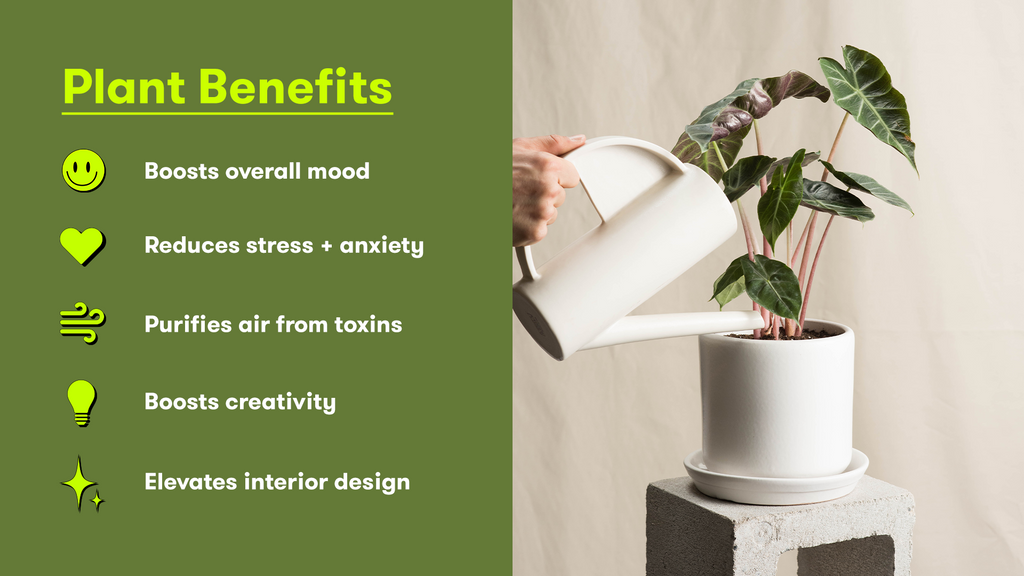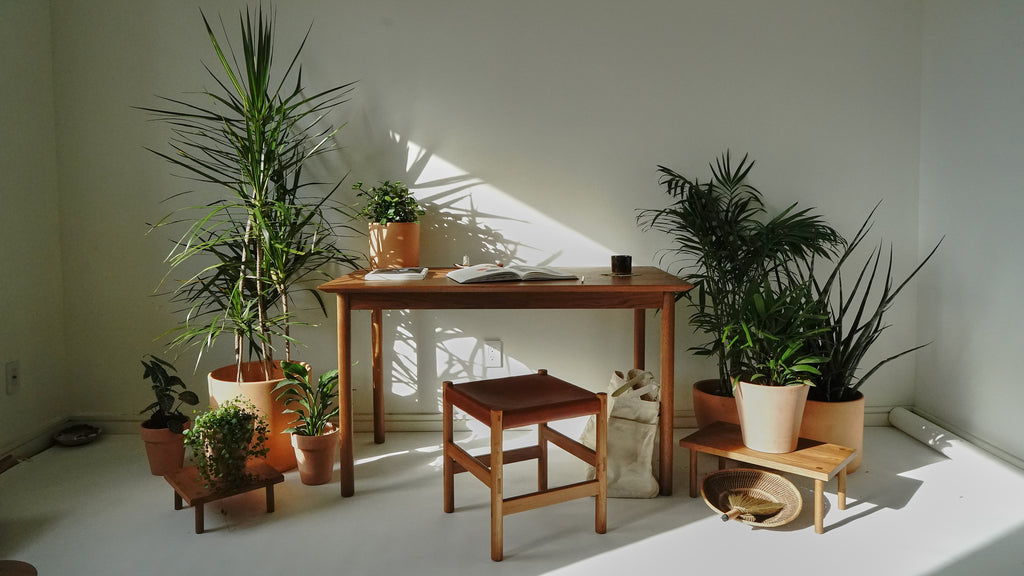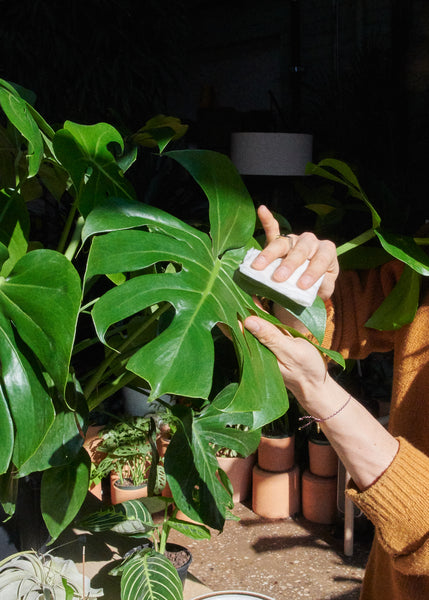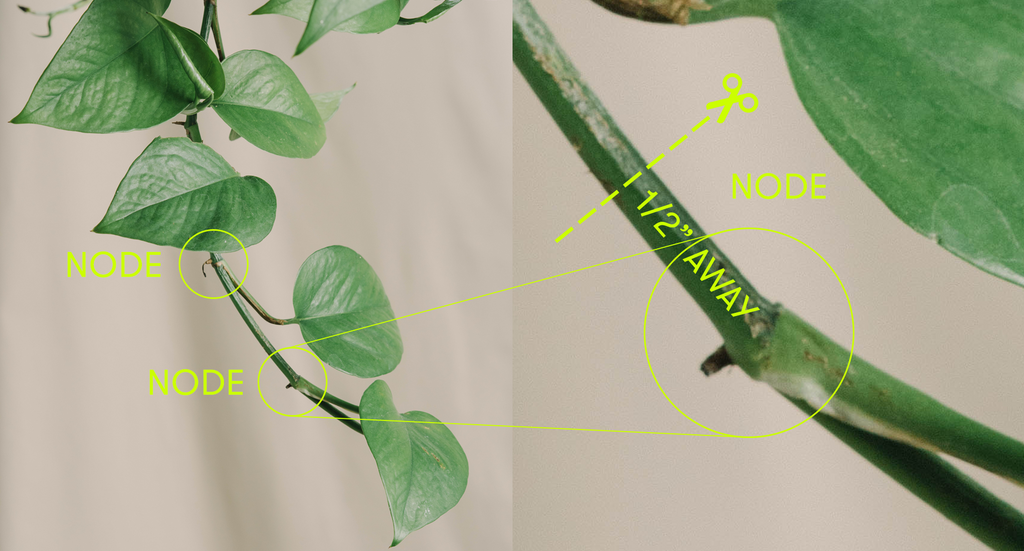Plants, the Cure for Cabin Fever

Chances are, like the rest of us, you have been confined within your homes for the past few weeks. You've finished Netflix, your dog is no longer excited to see you, and now that you've scoured every realm within 'legal' internet land for more Tiger King content, the dark web beckons your name. Luckily for you, we're going to put a stop to you potentially going to jail and suggest a few happier alternatives to keep you busy and retain your sanity. Alternatives that involve plants and getting your hands a little dirty.

Plants, if you didn't already know, are pretty frickin' awesome. They've been scientifically proven to purify our air, improve our overall mood, boost creativity, and reduce stress/anxiety levels. Not to mention that they also make our spaces feel so much better and beauti-full-er. They're the perfect remedy for us not being able to go outdoors as much.

Now, onto some of the things you can do with and for your plants:
1. Wipe down your plant's leaves.
Think of leaves as solar panels that are most optimal when they’ve got nothing between the sun and glass. This is more applicable to your broad leaf plants like fiddles, monsteras, and birds of paradise.

We mix two parts water and one part vinegar in a little bowl and dip it with a reusable towel and gently wipe the leaves down. This prevents dirt and grime from blocking the pores and also allows it to soak in as much sun efficiently as possible. We use vinegar specifically because it’s a readily available household item, acts as a natural pest/fungal deterrent, is less harsh on the leaves than soap, and gives the leaves a nice glossy coat.
The one side effect of this method is that it may leave your plant looking a little too good and make it more prone to theft. Please wipe responsibly.
2. Rotate your plants.
If you've noticed a few of your plants developing a weird lean in a single direction, it's time to rotate them. Leaning tends to happen when your plant grows towards the light source without being rotated for an extended period of time. Simply begin rotating them 90 degrees in a clockwise direction every 4-5 weeks to help your plant maintain even growth.
3. Prune off unsightly leaves.
Just like human beings, plants can contract diseases. Pruning helps prevent that by keeping pests and disease away, which are typically more attracted to dying leaves and struggling plants. If you spot any yellowing leaves, gently pluck or trim them off. No, it doesn't hurt your plant. If anything, it helps them divert any energy being put into the dying leaf back into the other healthier parts of the plant.
4. Mist your plants.
The majority of houseplants, excluding succulents and cacti, tend to thrive in higher humidity levels. Our homes are usually lower in humidity simply because they are not self-regulating amazonian ecosystems, BUT that doesn't mean we can't offer more humidity. The best solution would be to invest in an affordable humidifier like this one and set it up near your plants. Just fill it up and let it run. You can watch this humidifier model at work in the video below:
Credit: @Rooted NYC
The less effective, cheaper alternative would be to buy a spray bottle. If you've got the time, mist your plants every time you step away from your screen and take a lap around your apartment.
5. Propagate!
Many of us own at least one houseplant (pothos, spider plants, philodendrons, ZZ plants) that can be propagated in one of three ways: cuttings, root division or pups.
We'll briefly cover the easiest method, which is perfect for vining/trailing plants like pothos. Simply get a pair of clean shears/scissors and cut 1/2" below the node, like so:

You can then root it by either placing the cutting in a cup of water until it roots and then transplanting it into soil or by planting directly into soil. If you decide to use the latter method, we'd highly recommend using rooting hormone powder to encourage quicker and healthier growth.
6. Repot your plants
Spring is here! Which means it's probably time to upgrade your houseplants' living situation by repotting them into a bigger home. Doing this will replenish nutrients and stimulate growth, giving you the fuller jungle you deserve. We'll be releasing an in-depth repotting post soon, but in the meantime, take a gander at this nifty video.
That's it!
If you don't already have plants, that's completely okay—we'll just silently judge you from behind our screens and have a Zoom conference about it.
Jokes aside, you can easily get started as a plant parent with any of our bundles from our Social Distancing Collection, specifically our Breath-of-Fresh-Air Kit, a random assortment of four small easy-to-care-for houseplants.
Stay safe, stay well, and stay sane,
Rooted
